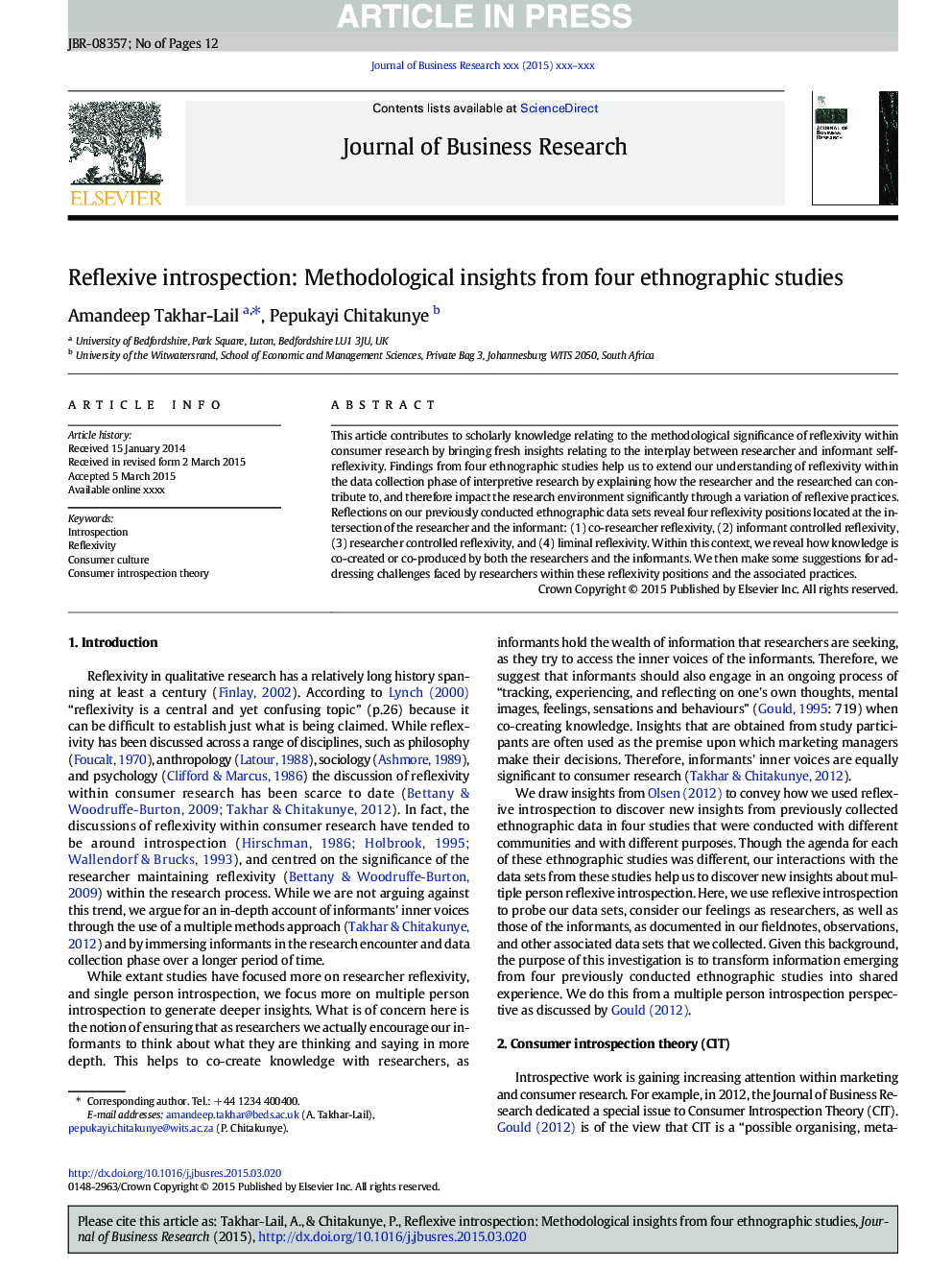| کد مقاله | کد نشریه | سال انتشار | مقاله انگلیسی | نسخه تمام متن |
|---|---|---|---|---|
| 10492696 | 940279 | 2015 | 12 صفحه PDF | دانلود رایگان |
عنوان انگلیسی مقاله ISI
Reflexive introspection: Methodological insights from four ethnographic studies
ترجمه فارسی عنوان
درون گرایی بازتابی: بینش متدولوژیک از چهار مطالعات قوم نگاری
دانلود مقاله + سفارش ترجمه
دانلود مقاله ISI انگلیسی
رایگان برای ایرانیان
کلمات کلیدی
خودآزمایی، بازتابی، فرهنگ مصرفی، تئوری درونی نظارتی مصرف کننده،
ترجمه چکیده
این مقاله به دانش علمی مربوط به اهمیت روش شناسی بازتابی در تحقیقات مصرف کننده کمک می کند و با در اختیار داشتن بینش تازه ای در رابطه با اثر متقابل بین محقق و خود-رفلسیویسی آگاهی دهنده است. یافته های چهار مطالعات قوم نگاری ما را در درک فهم بازتابی در فاز جمع آوری داده های تحقیق تفسیری، با توضیح اینکه چگونه محقق و تحقیق می توانند به آن کمک کنند و بنابراین به طور قابل ملاحظه ای تحت تأثیر تغییرات شیوه های بازخوانی تاثیر بگذارد، به ما کمک می کند. تفسیرها در مجموعه داده های قبلا انجام شده ی مردم شناختی ما چهار موقعیت انعکاسی را در تقاطع محقق و خبره نشان می دهد: (1) رفلسیویسی همکار پژوهشگر، (2) بازتابی از کنترل کننده اطلاعات، (3) رفلسیویسی کنترل شده توسط محقق، و (4) بازتابی در این چارچوب، ما نشان می دهیم که چگونه دانش و همکاری محققان و خبرنگاران همکاری می کنند یا همکاری می کنند. پس از آن، پیشنهادات خود را برای رسیدگی به چالش هایی که محققان در این موقعیت ها و واکنش های مرتبط با آن مطرح کرده اند، ارائه می دهیم.
موضوعات مرتبط
علوم انسانی و اجتماعی
مدیریت، کسب و کار و حسابداری
کسب و کار و مدیریت بین المللی
چکیده انگلیسی
This article contributes to scholarly knowledge relating to the methodological significance of reflexivity within consumer research by bringing fresh insights relating to the interplay between researcher and informant self-reflexivity. Findings from four ethnographic studies help us to extend our understanding of reflexivity within the data collection phase of interpretive research by explaining how the researcher and the researched can contribute to, and therefore impact the research environment significantly through a variation of reflexive practices. Reflections on our previously conducted ethnographic data sets reveal four reflexivity positions located at the intersection of the researcher and the informant: (1) co-researcher reflexivity, (2) informant controlled reflexivity, (3) researcher controlled reflexivity, and (4) liminal reflexivity. Within this context, we reveal how knowledge is co-created or co-produced by both the researchers and the informants. We then make some suggestions for addressing challenges faced by researchers within these reflexivity positions and the associated practices.
ناشر
Database: Elsevier - ScienceDirect (ساینس دایرکت)
Journal: Journal of Business Research - Volume 68, Issue 11, November 2015, Pages 2383-2394
Journal: Journal of Business Research - Volume 68, Issue 11, November 2015, Pages 2383-2394
نویسندگان
Amandeep Takhar-Lail, Pepukayi Chitakunye,
